M3U1
外研版八年级上册M3U1教案
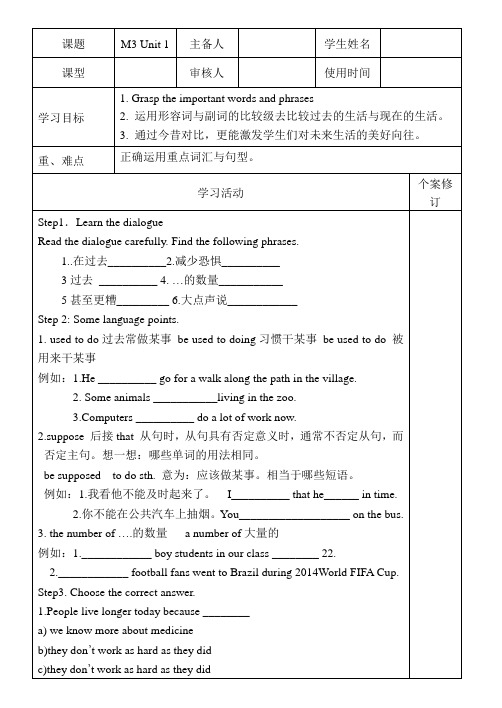
T_____ it’s a good way to write blogs about everyday life, I still p______ my old diary.
2.____________ football fans went to Brazil during 2014World FIFA Cup.
Step3.Choose the correct answer.
1.People live longer today because ________
a) we know more about medicine
A blog has both good and bad points (特点). The biggest problem is that anyone can read what you write in your blog. If you are not satisfied with a friend during school and write something bad about him in your diary, he will never know it . H______ , if you do this on the Internet, that friend may read your blog and get a_____ . So we have to be careful of what we write.
M3U1 词汇、短语、句型及练习

Module3 Unit1词汇、短语、句型及练习一、词汇sense[♦♏⏹♦]n.感官,官能;感觉;判断力;见识;意义,意思vt.感觉,觉察,意识到;了解,领悟(P1, Welcome to the unit)M1U3affect[☜♐♏♦]vt.影响;(病毒)感染(P1, Welcome to the unit)8—上hold[♒☜☺●♎]vt.拿着,抓住,抱住;容纳;持有,怀有(信念、意见);召开,举行(P1, Welcome to the unit)ability[☜♌✋●☯♦✋]n. 能力;才能(P1, Welcome to the unit)M1U3achievement[☜♦☞♓❍☜⏹♦]n.成就(P1, Welcome to the unit)9—全achieve[☜♦☞♓]vt.完成;达到,达成,获得(P1, Welcome to the unit) grey[♑❒♏✋] (AmE gray) adj.灰色的n.灰色(P2, Line2)thick[ ✋]adj. 浓密的;厚的(P2, Line3)9—全step[♦♦♏☐]n.步;脚步;步骤;步;阶段;台阶vi.迈步,行走(P2, Line4) 9—全wonder[ ♦✈⏹♎☜(❒)]vt.觉得奇怪;想知道n.惊讶,惊奇;奇迹,奇观(P2, Line5)9—全truth[♦❒◆]n.真相,事实(P2, Line10)9—全underground[ ✈⏹♎☜(❒)♈❒♋☺⏹♎]adj.地下的n.地铁 (AmE subway)(P2, Line11)8—上passenger[ ☐✌♦✋⏹♎✞☯(❒)]n.乘客;旅客(P2, Line14)M2U3entrance[ ♏⏹♦❒☜⏹♦]n.入口(P2, Line19)9—全empty[ ♏❍☐♦✋]adj. 空的vt.排空;倒出(P2, Line19)M2U2rough[❒✈♐]adj.汹涌的;粗糙的;大概的(P2, Line23)7—上brush[♌❒✈☞]n.刷子,毛刷,画笔;vt.(用刷子)刷净,刷亮;(用刷子)抹,涂;(用刷子或手)拂,掸,擦掉(P2, Line23)8—下fear[♐✋☜]n.害怕,惧怕vt.害怕;担心(P2, Line25)9—全stick[♦♦✋]vt.刺;戳;插;粘贴,粘住;(尤指迅速或随手)放置n.枝条;拐棍(P3, Line38)M2U3rare[❒☪☯]adj. 稀有的,罕见的(P3, Line53)M8U1plot[☐●♦]n.故事情节;阴谋,密谋vt.密谋;绘制(图表)(P3, Reading strategy)M3U2character[ ✌❒☯♦☜]n.(书写或印刷)文字,符号;人物;性格(P3, Reading strategy)M4U1aspect[ ✌♦☐♏♦]n.方面,层面(P3, Reading strategy)M2U2adventure[☜♎♏⏹♦☞☜]n.冒险;冒险经历(P5, Line4)M1U3count[ ♋☺⏹♦]vi.认为,算作;重要vt.数数(P5, Line5)M1U3branch[♌❒⏹♦☞]n.分支;分部;树枝(P5, Line16)global[ ♈●☜☺♌●]adj.球形的;全球的,全世界的;全面的(P6, B)globe[♑●☜☺♌]n. 地球仪;球体;世界,全球7—上afford[☜♐☎❒✆♎]vt.(通常与can、could或be able to连用,尤用于否定句或疑问句)买得起;(有时间)做;提供,给予(P6, B)M5U2flood[♐●✈♎]n.洪水;大批,大量vt. & vi. 泛滥,淹没;大量涌入(P7, A) 8—下temperature[ ♦♏❍☐☯❒☯♦☞☯(❒)]n.温度(P7, B)M2U1possibility[ ☐♦☜♌✋●☜♦✋]n.可能性(P9, Line1)9—全pleasant[ ☐●♏☜⏹♦]adj.合意的;令人愉快的;讨人喜欢的(P9, Line1)M2U3scientific[ ♦♋✋☜⏹♦✋♐✋]adj.科学的(P9, Line3)breathe[♌❒♓❆]vt. & vi.呼吸,吸入(P9, Line5)require[❒✋♦♋✋☜]vt.需要;要求,命令(P9, Line8)9—全experiment[✋♦☐♏❒✋❍☜⏹♦]n.实验,试验vi.做试验,进行实验,尝试(P9, Line9)M2U3various[ ♏☜❒✋☜♦]adj.各种各样的,不同的(P9, Line11)M1U2tolerate[ ♦●☯❒♏✋♦]vt.容忍,忍耐,忍受(P9, Line13)M2U3curious[ ☺☜❒✋☜♦]adj.好奇的;求知欲强的(P9, Line15)8—下collect[ ☜●♏♦]vt. & vi.收集,采集;收藏,搜集;聚积,积累;募集(P9, Line19)position[☐☜✋☞⏹]n.位置;职位,职务;姿势,姿态;见解,立场,形势(P9, Line21)M2U1convince[ ☜⏹✋⏹♦]vt. 使确信,使相信(P9, Line26)9—全remain[❒✋❍♏✋⏹]link-v. & vi留下;被遗留;剩余;保持不变(P9, Line28) M2U3connection[ ☯⏹✌☞⏹]n.联系(P11, A, Line1)M1U3approximately[☜☐❒♦✋❍☯♦●✋]adv. 大约(P11, A, Line4)M1U3expert[ ♏♦☐☜♦]n. 专家(P11, A, Line8)cotton[ ♦⏹]n.棉花;棉线,棉纱;棉制品(P11, B, Line1)glove[♑●✈]n.手套(P11, B, Line2)7—下camp[ ✌❍☐]n. 野营;营地vi.宿营;露宿(P11, B, Line5)M1U3recover[❒✋✈☜]vi. 复原,恢复健康vt.重新获得,恢复(P11, B, Line7) M2U1strength[♦♦❒♏☠]n. 力量,力气(P11, B, Line7)M1U1struggle[ ♦♦❒✈♈●]n.难事;斗争;努力vi.奋斗,努力;挣扎(P11, B, Line8) shoulder[ ☞☜☺●♎☜]n. 肩膀;(道路的)路肩(P11, B, Line18)freeze[♐❒♓](froze[♐❒☜☺], frozen[♐❒☜☺⏹]) vi. & vt.结冰,(使)冻结,(使)冻死;冷藏;(因害怕等)停住不动,惊呆,吓呆;冻结(资金、银行账户等)(P11, B, Line19)8—下task[♦♦]n.任务;工作;作业(P12, Title)operation[ ☐☜❒♏✋☞⏹]n.运转,运行,操作;手术;(有组织的)活动,行动(P16, Line2)operator[ ☐☜❒♏✋♦☜]n.操作人员;接线员M2U1attack[☜♦✌]vt. & vi. & n. 攻击;进攻(P16, Line4)M1U3treatment[ ♦❒♓♦❍☜⏹♦]n. 治疗;待遇;处理(P16, Line9)period[ ☐✋☜❒✋☜♎]n.时期,时代;学时,课时;周期,一段时间;句点(P16, Line11)M2U3various[ ♏☜❒✋☜♦]adj.各种各样的,不同的(P16, Line12)method[ ❍♏☜♎]n.方法,办法(P16, Line12)M2U3apply[☜☐●♋✋]vi.申请vt.使用,应用(P16, Line12)9—全patient[ ☐♏✋☞☜⏹♦]adj.有耐心的;忍耐的n.病人,患者(P16, Line12) shoulder[ ☞☜☺●♎☜]n. 肩膀;(道路的)路肩(P17, Line4)9—全metal[ ❍♏♦●]n. 金属(P17, Line5)M1U1sculpture[ ♦✈●☐♦☞☜]n.雕像,雕塑(P17, Line5)9—全sweet[♦♦♓♦]adj.甜的n.糖果;(餐后的)甜食,甜点(P17, Line19)M2U1assume[☜♦◆❍]vt.假设;认为(P18, Line12)8—下push[ ☐☺☞]vt.推;推动;督促(P18, Line20)object[ ♌♎✞✋♦]n.物体;客体,对象;目的,目标;宾语[☜♌♎✞♏♦]vi. 反对(P18, Line42)guard[♑♎]vt. & n.守卫,保卫,提防n.哨兵,警卫(P19, Line1)enemy[ ♏⏹✋❍✋]n.敌人,敌军(P19, Line2)M6U2rush[❒✈☞]vi. & vt.迅速移动;速送;突袭n.冲;匆忙,忙碌,繁忙(P19, Line3) 7—上case[ ♏✋♦]n.箱,盒,橱;事例,实例;案件,案情;病例,病案(P19, Line7) M2U1disappear[ ♎✋♦☜☐✋☜]vi.消失;失踪(P19, Line9)7—下direction[♎✋❒♏☞☜⏹]n. 方向(P19, Line13)9—全ancient[ ♏✋⏹☞☜⏹♦]adj. 古代的;古老的(P19, Line15)victory[ ✋♦☜❒✋]n. 胜利(P19, Line19)assessment[☯♦♏♦❍☯⏹♦]n.评估,评价(P20, Title)assess[☜♦♏♦]vt.评估;估算9—全block[♌●]n. 一大块,一批,(时间的)一段;街区,街段;障碍物,阻碍vt. & vi.堵塞,阻塞;妨碍,阻碍(P90, A1-4)9—全insect[ ]n. 昆虫(P91, B2-10)二、短语one another = each other 相互,互相(P1, Welcome to the unit) hold one’s nose捏住鼻子(P1, Welcome to the unit)sign language 手语(P1, Welcome to the unit)that far 那么远(P2, Line11)this bad 那么糟糕(P3, Line53)the rest of 其余的,剩下的(P2, Line16)glance at 瞥一眼,扫视(P2, Line16)in sight 在视野内,看得到(P2, Line20)set off 动身(P2, Lines20-21)wish for 盼望,企盼(P2, Line28)come along 到来,出现(P2, Line28)reach out (for) 伸出(手);伸手去拿(P3, Line32) & (P17, A, Line15) stare (up) at(抬头)凝视(P3, Line33)watch out for…留神(P3, Line37)come to one’s aid / help = help sb 帮助某人(P3, Line50)in relief 如释重负(P3, Line51)pay back 报答;偿还(P3, Line54)have sth. in common 具有共同特点(P3, Reading strategy) take…as an example 以……为例(P3, Reading strategy)run into 偶遇;撞上(P5, E, Line16)so far 到目前为止(P6, B)go hungry 挨饿(P6, B)weather forecast 天气预报(P7, B)breathe in 吸入(P9, Line5)be related to…与……有关(P9, Line5)be curious about 对……感到好奇(P9, Line15)be linked to…与……有关联(P9, Line23)by sight 根据外表或形象(P9, Line25)find one’s way out找到出路;找到解决问题的方法(P10-1)be certain about / of…确信(P10)clear up 清理,整理,打扫;放晴(P10)make sense有意义;讲得通(有道理)(P11, A-Title)make sense of sth.理解make the most of 充分利用(P11, A, Line2)turn off 关掉(P11, A, Lines10-11)make one’s way to…向……进发,前往(P11, B, Line5)recover some strength 恢复些体力(P11, B, Line7)get close to 靠近(P11, B, Line9)all of a sudden 突然(P11, B, Lines16-17)be frozen with fear因恐惧而呆住(P11, B, Line19)in the distance 在远处(P12, A, Line1)set sail for... 启航去(P12, A, Line5)manage to do…设法做成……(P12, A, Line8)make (good / great) progress取得(很大的)进步(P16, Line1)work out 算出;制订出;弄懂;锻炼(P16, Line9)be grateful to sb. 感激某人(P16, Line14)to one’s surprise 令人惊讶的是(P17, A, Lines10-11)come across 碰到,偶遇(P17, A, Line13)hesitate about…对……犹犹豫豫(P17, A, Line17)contrary to…与……相反(P18, Line11)on the contrary 相反(P91, B1-1)mistake…for…把……错当成……(P18, Line17)result in…导致(P18, Line27)follow one’s suggestions / advice 遵循某人的建议(P18, Lines30-31)roll up 卷起(P19, Line7)reach into 将手伸进……(P19, Line7)a wonderful sense of direction 极好的方向感(P19, Lines12-13)set a bird loose 放飞一只鸟(P19, Line8)find one’s way home 找到回家的路(P19, Line13)over a long distance 越过很长一段距离(P19, Line13)have trouble with sth. 在某方面有问题(P90, A1-1)at the sight of…看到……(P90, A2-3)in sight 在视野之内(P90, A2-5)from time to time 时不时(P90, A2-6)a waste of time 浪费时间(P92, C1-5)make up one’s mind to do sth. 下定决心做某事(P92, C1-8)give off 发出(气味、光、热)(P93, D1, Line13)三、句型1、Once out in the street, she walked quickly towards her usual bus stop. (P2, Line7)2、She had a feeling that she was being watched by a tall man in a dark overcoat.(P2, Lines14-15)3、Polly found herself staring up at the face of an old man with a beard. (P3, Lines32-33)4、In a scientific study, doctors asked 20 men and 20 women to keep their hands in very hotwater for as long as possible while breathing in different smells. (P9, Lines3-6)5、It is believed that strong smells can affect the senses. (P9, Lines7-8)6、One explanation is that women’s sense of smell is better developed than that of men.(P9, Lines22-23)7、Now, they have become convinced that the sense of smell also helps. (P9, Lines25-26)8、You are 30 times more likely to be hit by lightning than be attacked by a shark.(P18, Lines56-59)9、However, it was in war that they found their greatest use. (P19, Line16)四、特别问题1、The truth is that it is too foggy for the bus to run that far. (P2, Lines10-11)You see, a fog this bad is rare. (P3, Line53)2、翻译下列句子◆ The tall man was nowhere to be seen.______________________________________________________________________ Now she wanted to run, but fear held her still.______________________________________________________________________ ♦ I can remember some terrible fogs, but maybe that was before your time.______________________________________________________________________ ⌧我看不见你的脸,但听声音你很年轻。
八年级上册英语m3u1知识点

八年级上册英语m3u1知识点在八年级上册英语中,Module 3 Unit 1是关于“Travel by train”的内容,下面是该单元的核心知识点。
1. 表达乘火车旅行的词汇及短语:train station - 火车站platform - 站台ticket office - 售票处ticket - 票one-way ticket - 单程票return ticket - 往返票timetable - 时间表departure time - 出发时间arrival time - 到达时间seat - 座位2. 用英语表述火车票的购买:How much is a one-way ticket to London? - 一张去伦敦的单程票多少钱?Can I have a return ticket to Paris, please? - 我想要一张巴黎来回的票。
What time is the first/last train to Manchester? - 去曼彻斯特的第一班/最后一班火车什么时候?Can I reserve a seat? - 我能预订座位吗?3. 用英语表述火车的时刻表:What time does the train leave/arrive? - 火车几点出发/到达?What platform does the train leave from? - 火车从哪个站台出发?4. 表达路线和方向的词汇及短语:north - 北south - 南east - 东west - 西The train is going north/south/east/west. - 火车往北/南/东/西开。
5. 表述旅行活动的词汇及短语:sightseeing - 观光tourist attraction - 景点guide - 导游map - 地图camera - 相机souvenir - 纪念品6. 熟练运用简单的交通指令:Excuse me, how do I get to the train station? - 对不起,请问怎么去火车站?Take the bus number 10 and get off at the train station. - 乘坐10路公交车,在火车站下车。
外研版九年级下册英语《M3U1》ppt

Is life today better than it was in the past? 3. What does Betty ask?
Betty asks if they can write about medicine and pollution.
第二十六页,共四十四页。
I didn’t find anything funny about it. 我觉得这事一点儿都不可笑。 There is nothing new in the store.
商店里没有什么(Me)新东西。
很多副词都以-ly结尾,但是“名词+ly”的词 则多为形容词,如:weekly, friendly等,应
4. What does Daming ask?
Daming asks if they can write about personal safety.
第七页,共四十四页。
第八页,共四十四页。
People are wealthier today, and they live longer than in the past.
with the ordinary diseases
c) so people work harder than before
第十七页,共四十四页。
3. People take less exercise because ____. a) they do not need to
b) they drive cars instead
第九页,共四十四页。
We know more about medicine today, and there’s less fear of getting ill because we
M3U1词汇
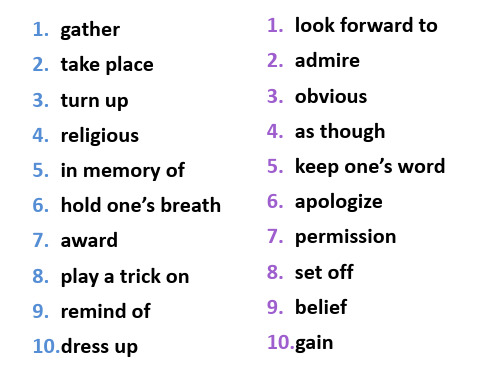
• religious /ri'lidʒəs/ adj.宗教上的;信奉宗教的;虔诚的 • feast /fi:st/ n. 节日;盛宴 • starve /stɑ:v/ vi. & vt. (使)饿死;饿得要死 • beauty /'bju:ti/ n. 美;美人 • harvest /'hɑ:vist/ n. & vt. & vi. 收获;收割 • △ grave /ɡreiv/ n. 坟墓;墓地 • hunter /'hʌntə/ n. 狩猎者;猎人 • ancestor /'ænsestə/ n. 祖先;祖宗 • Mexico /'meksikəu/ n. 墨西哥(拉丁美洲国家) • △ incense /'insens/ n. 熏香;熏香的烟 • celebration / seli'breiʃn/ n. 庆祝;祝贺 • origin /'ɔridʒin/ n. 起源;由来;起因 • △ seasonal /'si:zənl/ adj. 季节的;季节性的 • △ Obon /ə'bɔn/ n. (日本)盂兰盆节
1. gather 2. take place 3. turn up 4. religious 5. in memory of 6. hold one’s breath 7. award 8. play a trick on 9. remind of 10.dress up
1. look forward to 2. admire 3. obvious 4. as though 5. keep one’s word 6. apologize 7. permission 8. set off 9. belief 10.gain
小学英语第三册M3U1(新标准)

Good morning,Sam.
Let’s chant
• Door,door,point to the door. • Window,window,point to the window. • Blackboard,blackboard, • point to the blackboard. • Bird,bird,point to the bird.
Module 3Unit 1 Point to the door.
东关小学 刘秀红
Learning Aims(学习目标) (学习目标)
• Learning aims (学习目标 学习目标) 学习目标 1. A、认读句子:基本能听懂、会 说、会读,并运 会读, 、认读句子:基本能听懂、 等语句。 用 sit down! Stand up! Point to the…..等语句。 等语句 • B、识记单词:Door please window blackboard 、识记单词: bird 2.能力目标:发音准确,能听懂录音。会用本课词汇 能力目标: 能力目标 发音准确,能听懂录音。 模仿录音语调
Aim 1
Aim 2
• Task1:Words and phrases(词汇 词汇) : 词汇 • Listen and circle the words and phrases(听 听 音并圈出下列词汇) 音并圈出下列词汇 • Check in groups (用自己喜欢的方式组内练 用自己喜欢的方式组内练 习) • Group show (用自己喜欢的方式展示 用自己喜欢的方式展示) 用自己喜欢的方式展示
小 组 讨 论 学 习,描 述 图 片 (四幅图片)
Point to the door. door,window, bird,blackboar d,please, Point to the window. Point to the blackboard.
高一英语:M3U1Reading课堂重点

请大家把本节网课的重点抄到自己的笔记本上Unit 1 Reading词汇精讲1.confuse v t.使糊涂,使迷惑(教材P1) However, even if we have good senses, they can still confuse us.然而,即使我们有良好的感官,它们仍会让我们感到迷惑。
(1)confuse...with/and...混淆;辨别不清(2)confused adj. 困惑的,混乱的confusing adj. 令人费解的;使人困惑的(3)confusion n. 困惑in confusion 处于混乱状态①I always confuse John with his brother; they are so much alike.我总是分不清约翰和他的哥哥,他们长得太像了。
②There was a confused look on his face when he met with the confusing problem.(confuse)当他遇到令人费解的问题时他脸上有困惑的表情。
confusing表示事物让人迷惑的;而confused表示人受到事物的影响而感到迷惑,主语是人。
当修饰一个人的表情(look, expression)及声音(voice)时,一般用confused。
2.observe v t.观察;注意到;评论;遵守;庆祝(节日)(教材P2)As Polly observed the passengers on the train, she had a feeling that she was being watched by a tall man in a dark overcoat.当波莉观察地铁车厢里的乘客时,她感觉到有一个穿黑色大衣的高个子男人一直在注视着她。
(1)observe sb.do sth.观察某人做某事(全过程)observe sb.doing sth. 观察某人正在做某事(2)observe the traffic rules 遵守交通规则(3)observe Christmas 过圣诞节observe sb.do的被动结构是:sb.be observed to do。
小学英语外研社版四年级M3U1教案

课题名称Module3 Unit1 Have you got any stamps from China? 教学时间授课老师教学目标设计a.知识目标:Stamp album Canada America collect What are you doing? I’m putting my new stamps into my album. Have you got any stamps from China? No, I haven’t. b. 技能目标:谈论某人是否拥有某物或某人拥有何物。
c. 情感态度目标:培养学生有自己的某一样兴趣。
教学目标制定依据学生分析Ss can hardly read the whole dialogue. 教材分析It’s s a a a long long long dialogue, dialogue, there are two tences.It’s s a a a little little hard hard for for ss to master it. 教学过程教学时间教学环节教师活动学生活动设计意图(课堂小记)Step1Warm-up Step2 Presentation Sing the song: The Great Wall of China. a. Teacher prepared the stamps and album. T: What are they?(师出示邮票) Ss: they are stamps. T: What is it?(师出示邮册) Ss: It’s an album. b.教师请一位同学到讲台前做放邮票的动作,然后引导全班同学问他:What are you doing? 教师帮助这一同学回答:I’m m putting putting my my stamps stamps into the album. c.Teacher shows the picture of the text. And ask: Sing the song together. Read the new words. Ss ask and answer. 热身,激起兴趣。
高中英语M3U1知识点回顾
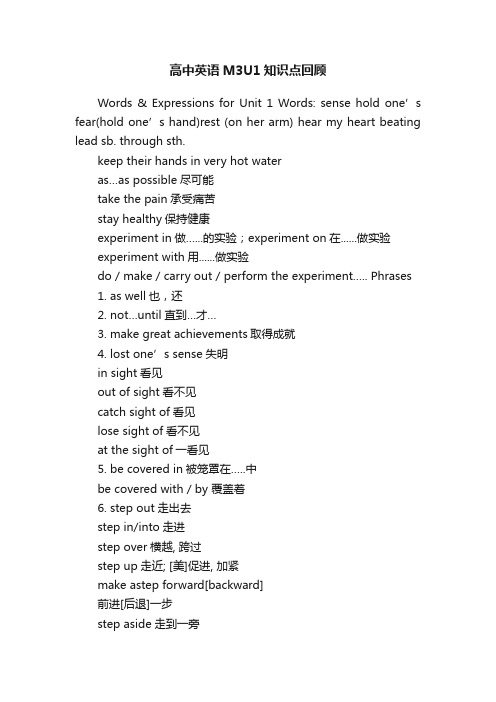
高中英语M3U1知识点回顾Words & Expressions for Unit 1 Words: sense hold one’s fear(hold one’s hand)rest (on her arm) hear my heart beating lead sb. through sth.keep their hands in very hot wateras…as possible尽可能take the pain承受痛苦stay healthy保持健康experiment in做…...的实验;experiment on在......做实验experiment with用......做实验do / make / carry out / perform the experiment….. Phrases1. as well也,还2. not…until直到…才…3. make great achievements取得成就4. l ost one’s sense失明in sight看见out of sight看不见catch sight of看见lose sight of看不见at the sight of一看见5. be covered in被笼罩在…..中be covered with / by 覆盖着6. step out走出去step in/into走进step over横越, 跨过step up走近; [美]促进, 加紧make astep forward[backward]前进[后退]一步step aside走到一旁step by step逐步地, 循序渐进地7. the rest of 其余的,其余部分8. glance at匆匆看一下take / have a glance at9. set off (for) 出发set out (for)10. by the time到…为止11. wish for=look forward to期盼;盼望12. reach out伸出reach for取13. stare up at抬头凝视着14. (say sth.) in one ear15. watch out for留心注意keep a watch onwatch out 当心,小心look out (for); take care (of)be careful (of)16. get across越过,通过17. follow one’s advice听从某人的建议18. be related to与…有关19. be linked to与…有关;与…联系20. be in a position to do(处于状态)有办法/有可能做某事21. lie in在于22. find one’s way out找出…出路23. make sense讲得通,有意义24. have something to do with与…有关25. late on = later以后26. rather than而不是;宁愿27. turn down调小28. can’t help doing sth.情不自禁做某事29. warm up热身30. get close to逼近31. turn around四周环顾32. be frozen with由于…呆了33. sweat with fear吓出汗了34. all of a sudden = all at once =suddenly35. ring out36. in the distance在远处37. at the beginning ofAt the end ofIn the middle of38. set sail for启航39. be through经历Reading(P2-3)Read the text carefully and answer the following questions to help you understand the text further.1. What did Polly get to know from the weatherman?A. It was going to rain.B. There would be strong wind.C. There would be a thick fog in the afternoon.D. There would be no buses at the bus stop in the afternoon.2. Why did she walk quickly towards her usual bus stop?A. She wanted to get a seat on the bus as it was crowed.B. She wanted to know if there was a bus.C. She had something urgent (紧急的) to deal with.D. She felt she would get wet as it was going to rain.3. Who might the tall man in a dark coat be in your opinion?A. the old blind man.B. the bus conductor.C. a robber.( 强盗)D. one of his colleagues.4. Why did the man brush Polly’s face?A. He did it on purpose. (故意地)B. He was blind and he didn’t know there was someone in front of him.C. He wanted to ask her to go away.D. He wanted to help Polly go along the street.5. On sunny days, how can the blind like the old man get across the road?A. They can manage it without any help.B. The have a special road to take.C. Some workers are arranged specially (专门地) to help them.D. Many warm-hearted people would like to offer their help.Module 3 Unit 1Language points (P1-5)1.confuse vt. –to make someone feel that they can’t think clearly or don’t understand别告诉我这么多,-- 你把我弄糊涂了。
八上M3U1教学设计

(1)What’s the matter with....?
(2)Nothing is more enjoyable than playing tennis.
(3)Staying at home is easier than going to the stadium.
3.语法或功能项目:comparative adjectives and adverbs(more....)
外研版八年级上册Module3Unit 1教学设计
一、基本信息
教材与主题
外研版八上Module3Sports
Unit 1Nothing is more enjoyable than playing tennis.
课型
听说课
教法与学法
3Pmodel and task-based learning
学段
八年级上册
To help students get the main idea of the dialogue andcultivate their thinking ability by inferring where the dialogue happen.
To improve students’ ability of listening for details and check their comprehension of the conversation by asking the questions.
Which one do you like, watching TV or playing tennis? Why?
Life lies in movement.
Sport is the source of health.
沪教版上海英语三年级英语上M3&M4期末复习资料
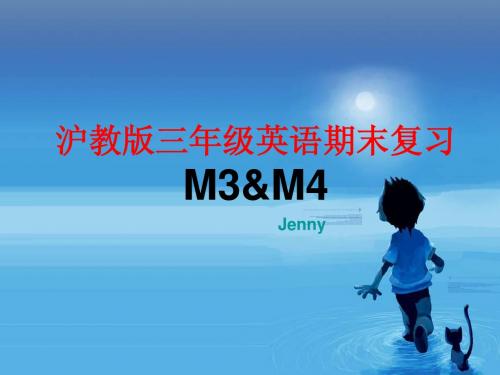
M3&M4
Jenny
M3知识点
M3U1: school 学校, library 图书馆, toilet 厕所, hall 大厅,剧 院, playground 操场, in/on the playground 在操场上, classroom 教室, what 什么, is 是, this 这,这个, that 那, 那个, my 我的, your 你的, yes 是, no 不是. 句子:What’s this ? It’s my school. Is this your classroom ? No. It’s the hall. new 新的, old 旧的, here这里, there 那里, welcome 欢迎, loot at 看…, picture(photo) 图片, our 我们的, read and write 读写, sing and dance 唱歌和跳舞, play basketball 打蓝球, my school 我的学校, 句子: Thank you. You’re welcome. Is that the library ? Yes, it is.
animas
can not picture
62.what's(全写)
63.it is(缩写) 64.they are(缩写)
47.box(复数)
48.desk(同义词) 49.colour(动作词) 50.paper(复数)
boxes
table colour paper
65.Kitty's(全写)
66.baby(复数) 67.families(单数) 68.what(同类词)
Kitty is
babies family who、 how
外研版(三起点)六年级上册M3U1
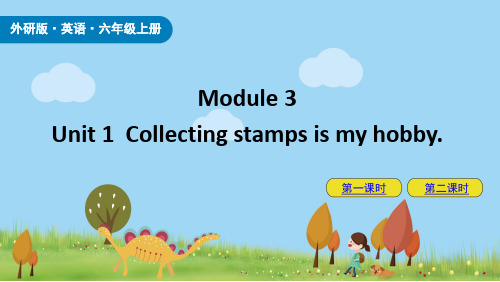
stamps.
Homework
1.朗读并背诵第一单元学习的单词。 2.朗读活动二的课文。 3.背诵活动三的句型。 4.用have got和has got各写一个句型。
They have got famous people on them.
A:Have you got any stamps from China?
B:Yes, I have. This stamp is from China.
Practise.
These stamps are from China. This one has got a picture of the Great Wall on it.
And all of these stamps are from China too.
Daming:Oh! These stamps are from my
letters!
Simon:That‘s right!
Simon‘s mum:Look, boys! Letters for you! Daming:Is there a letter for me?
A. stamp B. stamps C. stampes
2. C stamps is my hobby.
A. Collect B. Collects C. Collecting
3. They are famous B and
.
A. men ;woman B. men; women C. man; women
外研版·英语·六年级上册
Module 3 Unit 1 Collecting stamps is my hobby.
第一课时
第二课时
第一课时
外研版三年级英语上册M3U1(含音频)
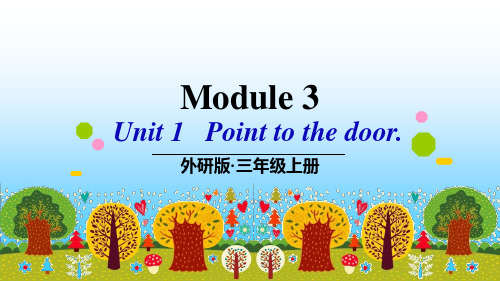
Listen and chant.
Point to “hello”! Point to “hi”! Point to “you”! And point to “I”!
Grammar
Point to “hello”! 指向“hello”!
point的意思是“指”。当要表达“指向某人或某
物”时,就用句型“point to + (the)+人/物”,其中
to表示方向。 point还可以作名词,指比赛和竞技中的“得分”,
有复数形式,可以在单词后面加“s”。此外,point还
有“点”的意思。
Listen, point and find “Point to ...”
Listen, point and find “Point to ...”
Good morning,
Module 3
Unit 1 Point to the door.
外研版·三年级上册
New words
point
指
sit
坐
to
向……
down
向下
the 这个,那些 stand
站
door
门
up
向上
New words
window
窗户
blackboard 黑板
bird
鸟
tweet
(鸟)啾啾的叫声
Listen and chant.
2.朗读本课句型,并在生活中运用这些句型
交流对话。
Point to the door. 指向门。
Point to the window. 指向窗户。
Practise.
A:Stand up, please. B:(stands up) A:Sit down, please. B:(sits down) A:point to... B:(points to...)
牛津版小三英语上(M3U1 My school 同步知识梳理)
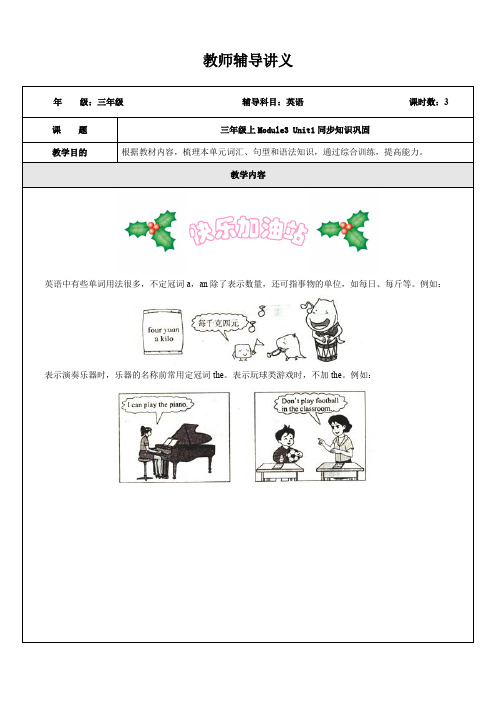
教师辅导讲义英语中有些单词用法很多,不定冠词a,an除了表示数量,还可指事物的单位,如每日、每斤等。
例如:表示演奏乐器时,乐器的名称前常用定冠词the。
表示玩球类游戏时,不加the。
例如:Unit 1 My schoolI. Words 单词1.school 名词(1) 学校[例句] This is a school. 这是一所学校。
Where do you go to school? 你在哪里上学?(2) 上课时间;上学阶段[例句] Their children are still at school. 他们的孩子还在上学。
I like to play basketball after school. 放学后,我喜欢打篮球。
[记忆链接] schoolboy(中小学)男生schoolgirl (中小学)女生schoolteacher(中小学)教师2.library 名词图书馆[例句] The library in our school is very big.我们学校的图书馆非常大。
You must keep silent in the library.图书馆里必须保持安静。
[常见词组] a school library学校图书馆 a city library市图书馆a public library公共图书馆 a university library大学图书馆3.toilet 名词卫生间;厕所[例句] The toilet is very clean.这个厕所十分干净。
There are two toilets in my new house.在我的新房子里有两个卫生间。
[友情提示] 家中的“厕所”通常叫做toilet,在非正式场合叫做loo。
lavatory和WC是正式的、老的说法。
公共场所的厕所叫做ladies/gents。
在美国英语中,家中的“厕所”叫做bathroom,公共场所的叫做restroom或ladies' room/men's room。
外研版小学五年级英语上册M3U1课件

Homework
1.听、读课文内容三遍,家长签字。 2.用where, when, what, how 写五个句子。
第二课时
What did you do yesterday?
I watched TV.
Where did you go
yesterday?
I went to the bookshop.
Daming: Mm, you had a good day!
──── How did you get there? ──── By car.
────How did you know it? ──── Amy told me.
──── How do you go to school? ──── On foot.
Watch the video.
4
Listen, read and act out.
Amy and Daming are calling each other. They are talking about some places. Where did they go?
Watch the video.
Sum up.
词汇: weekend, place, British, how, best, trip, along, river, hour, twenty, minute, took.
短语: lots of, at the weekend. 句型: where, what, how引导的一般过去时的特殊疑 问句 Where/What/How + did + 主语 + 动词原形 + 其他?
Big Ben and the London Eye.
(完整版)M3U1名词性从句及答案
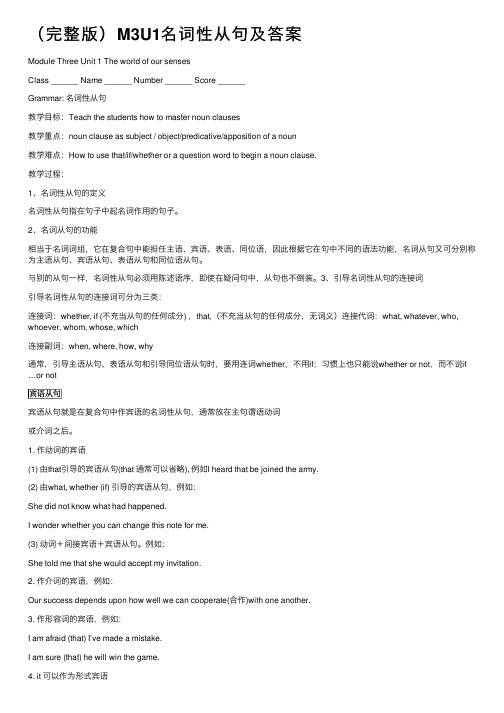
(完整版)M3U1名词性从句及答案Module Three Unit 1 The world of our sensesClass ______ Name ______ Number ______ Score ______Grammar: 名词性从句教学⽬标:Teach the students how to master noun clauses教学重点:noun clause as subject / object/predicative/apposition of a noun教学难点:How to use that/if/whether or a question word to begin a noun clause.教学过程:1、名词性从句的定义名词性从句指在句⼦中起名词作⽤的句⼦。
2、名词从句的功能相当于名词词组,它在复合句中能担任主语、宾语、表语、同位语,因此根据它在句中不同的语法功能,名词从句⼜可分别称为主语从句、宾语从句、表语从句和同位语从句。
与别的从句⼀样,名词性从句必须⽤陈述语序,即使在疑问句中,从句也不倒装。
3、引导名词性从句的连接词引导名词性从句的连接词可分为三类:连接词:whether, if (不充当从句的任何成分) ,that,(不充当从句的任何成分,⽆词义)连接代词:what, whatever, who, whoever, whom, whose, which连接副词:when, where, how, why通常,引导主语从句、表语从句和引导同位语从句时,要⽤连词whether,不⽤if;习惯上也只能说whether or not,⽽不说if …or not宾语从句就是在复合句中作宾语的名词性从句,通常放在主句谓语动词或介词之后。
1. 作动词的宾语(1) 由that引导的宾语从句(that 通常可以省略), 例如I heard that be joined the army.(2) 由what, whether (if) 引导的宾语从句,例如:She did not know what had happened.I wonder whether you can change this note for me.(3) 动词+间接宾语+宾语从句。
初二上M3U1(省专用)

Swimming isn’t safe, it’s dangerous. Running isn’t relaxing, it’s very tiring. So running is safer and more tiring than swimming.
Staying at home is easier than going to the stadium.
e.g. Tennis is exciting. Table tennis is more exciting than tennis.
difficult
more difficult more expensive
expensive
… Table tennis is ….
…
Tennis is … than table tennis.
棒球 n.
排球 n.
烦人的;无聊的 adj.
令人激动的 adj.
令人愉悦的 adj. (体育比赛中)得(分) v. 已经;早已 adv. 问题;麻烦 n. 怎么了?
hurt /hɜ:t/
(使)疼痛; (使)受伤 v.
enjoyable/In'dʒɔIəbl/
Olympics /ə'lImpIks/
Table tennis is more popular in China than in other countries. Watching tennis is safer than playing it.
Last week the football match on TV was so boring because no one scored at all. This week’s NBA match is very exciting.
四年级上册英语m3u1的课文

四年级上册英语m3u1的课文第一部分:概述1. 关于四年级上册英语m3u1的课文介绍四年级上册英语m3u1的课文是学生在学习英语课程时所接触的初级阶段的课文内容。
通过学习这些课文,学生可以掌握基本的英语词汇和语法,提高自己的阅读和听力能力。
本文将对四年级上册英语m3u1的课文进行详细介绍,包括课文内容和重点句型。
2. 本文结构安排本文将按照以下顺序对四年级上册英语m3u1的课文进行介绍:首先介绍课文的标题和主题,然后分析课文的内容和重点词汇,最后总结课文的重点句型和语法。
第二部分:课文内容介绍1. 课文标题和主题四年级上册英语m3u1的课文的标题是《My Family》。
课文讲述了主人公Jim家庭成员的情况,并介绍了他家人的基本情况和兴趣爱好。
2. 课文内容概述课文开篇介绍了Jim的父母和他的两个兄弟,然后详细描述了每个家庭成员的特点和爱好,最后介绍了Jim的家庭照片。
整个课文以简单明了的语言,生动形象地展现了一个幸福和美满的家庭形象。
第三部分:重点词汇分析1. 家庭成员课文中涉及到的家庭成员有father(父亲)、mother(母亲)、brother(兄弟)、sister(姐妹)、grandpa(爷爷)和grandma (奶奶)等词汇。
2. 兴趣爱好课文中涉及到的兴趣爱好有play(玩耍)、read(阅读)、draw (画画)、run(跑步)等词汇。
第四部分:重点句型和语法总结1. 描述家庭成员课文中出现了一些描述家庭成员的句型,如“My father is tall and thin.”(我的父亲高高瘦瘦。
)“My mother likes to read.”(我的母亲喜欢阅读。
)等。
2. 介绍兴趣爱好课文中还包含了一些介绍兴趣爱好的句型,如“I like to play football.”(我喜欢踢足球。
)“My sister likes to draw.”(我的姐妹喜欢画画。
)等。
第五部分:结论通过对四年级上册英语m3u1的课文《My Family》进行介绍,我们可以看到,这篇课文内容生动,贴近学生生活,帮助学生提高听力和阅读能力,掌握基本的家庭成员和兴趣爱好的英语表达。
